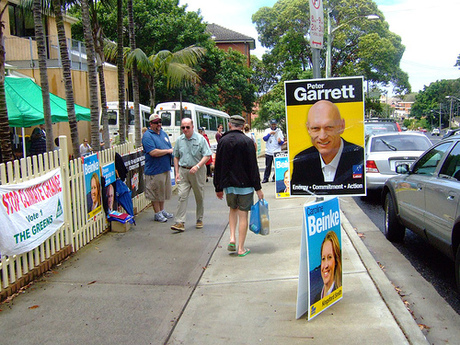Social media a dangerous tool for politicians

Pollies beware - ineffective use of social media is more likely to hinder than help a political campaign, according to media researcher Axel Bruns.
While social media offer politicians a way to engage with new audiences they may not be able to reach through mainstream media, an online gaffe can be damaging to a campaign.
Bruns - an Associate Professor at Queensland University of Technology’s ARC Centre of Excellence for Creative Industries and Innovation (CCI) - is leading a research team tracking the activity and performance of election candidates on Twitter.
“Using social media effectively can help with the campaign, but it’s more likely to put politicians at a disadvantage if they make bad mistakes, which can quickly turn into major issues, especially once they’re picked up by mainstream media,” Bruns said.
“So the penalties for a badly conceived tweet or post may be greater than the benefits from a good one. Especially for candidates who are inexperienced social media users, participating online can be a significant risk.”
The researchers have also discovered that leading in social media metrics does not necessarily translate to popular support. Kevin Rudd currently has 1.37 million Twitter followers, compared to just 194,000 for Tony Abbott.
“Despite Rudd’s lead in social media, he’s trailing in the polls. So he may be talked about more often than Abbott is on Twitter, but the tweets that mention him may have expressed disapproval as much as support for him,” Bruns said.
Abbott was also mentioned 5000 more times on Twitter in week two of the campaign, suggesting that his lead in the polls and his controversial purported recent statements about gay marriage are leading to increased Twitter scrutiny of the opposition leader.
Labor is making more use of social media to attempt to address its trailing performance in the polls, while the Coalition is more interested in avoiding mistakes to maintain its lead, Bruns said.
“[Labor] needs to use any type of media, including social media, to reach as many people as they can, especially the ones who haven’t made up their minds,” he said.
“In this case, Twitter and Facebook can be very useful in helping Labor spread their views, policies and ideas to the ‘undecided’ group. Whether this will be enough to attract more voters, we’ll find out after the election.”
Increasing AI-generated data threatens LLM reliability: Gartner
Gartner predicts 50% of organisations will adopt zero-trust data governance as...
Data Privacy Day: Why more security tools don't mean better data protection
As data volumes grow and environments become more complex, many IT leaders are responding by...
Synthetic data and real privacy: safeguarding AI in Australia
Data Privacy Day (Jan 28) presents a timely opportunity for leaders to step back and focus on AI...



